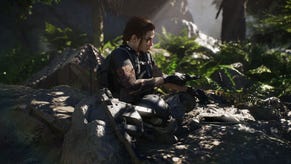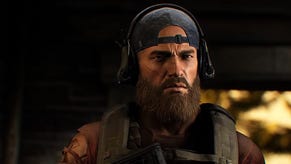RIP, PC: How Ubisoft managed to be wrong and right
Ubisoft's continuing struggles with the PC market still draw community ire, but Nathan Grayson believes the publisher may finally be on the right track, even if it isn't moving quickly enough.
PC gaming's transforming in a big way, but many hardcore PC gamers still pine for the past, back when big-budget retail games were made – nay, forged – with their beefy rigs in mind. So it's time for big publishers to put up or shut up. Bring out the big guns. Give us something with the impact, scope, and craftsmanship of a Battlefield 3 and the business model of a Ghost Recon Online.
There are two topics you never bring up around anybody if you want to keep conversation free of colorful language and knife fights: politics and religion. With PC gamers, though, you'd do well to dive face-first into those landmines long before dropping a bomb of an entirely different sort: Ubisoft. And why not? The Assassin's Creed publisher has assassinated any good will it might have accrued via DRM that essentially locked up paying customers and threw away the key while simultaneously justifying pirates' unscrupulous actions.
And that's just the beginning. Once considered legitimately shocking, last-second delays of Ubisoft PC games have now become par for the course. And let's not forget the recent From Dust fiasco, which started as a white flag and ended as a kick in the teeth. It's little wonder, then, that Ubisoft's rapidly descended to the rank of public enemy number one.
This week, however, saw things reach a new fever pitch. First, some allegedly lost-in-translation comments from I Am Alive creative director Stanislas Mettra had PC gamers spitting flames over accusations of incessant “bitching” and – most alarmingly – claims that they wouldn't even buy a PC version of I Am Alive anyway. Since then, Mettra's re-opened the door he seemingly slammed shut, saying that Ubisoft is “still working to see the feasibility of” a PC version. Granted, that comment's very much at odds with one I received a couple months ago, but that's honestly neither here nor there at this point.
The most telling slight, however, was Ubisoft's sudden about-face on Ghost Recon: Future Soldier's PC version. Initially, the port was like a ghost insofar as it constantly lurked in the background – known only to a select few. Now, though, it's like a ghost in that it doesn't f**king exist. But hey, there's still Ghost Recon Online and, er, ManiaPlanet for PC gamers to look forward to, right? And that's where Ubisoft's diaboloical plan finally begins to makes sense – while also going horribly, horribly wrong.
PC gaming is dead, long live PC gaming
Big-budget PC games aren't what they used to be. Where once games like Doom and Quake blew minds and broke banks on PC, the biggest hits now put their best feet forward on consoles – bleeding-edge PC tech be damned. Why? The short answer is, “Piracy, duh.” But the long answer is, er, a bit longer. And we'll get to that in a second. First, though, I'm going to attempt to explain to you why Ubisoft has been – in a few key ways – absolutely correct in its recent treatment of the PC. Please save all questions and skull-splitting hatchets until after the presentation.
Triple-A PC gaming is dead. Done. Over. Six-feet under. Now, it's important to understand that I'm referring to triple-A gaming in the traditional (perhaps even colloquial) sense. Specifically, I mean $50-$60 price tags, physical retail copies, glitzy hype-driven marketing campaigns, and one-time paid-in-full “finished” game releases. Piracy, of course, is holding the smoking gun, but perceived inaccessibility's at least helping bury the body. As such, Ubisoft saw the writing on the wall and reacted accordingly. Ghost Recon: Future Soldier's silent stroll into console-only territory, I believe, is the culmination of that.
Logically speaking, it all checks out. Here's the problem, though: for far too long, Ubisoft misread the writing. It thought it saw a platform on its deathbed and chalked everything up to “piracy this, piracy that.” In reality, PC was (and is) experiencing some particularly excruciating growing pains. It's evolving, and evolution – as humanity's lack of super lungs that process all polution and Superman skin that deflects bullets will tell you – doesn't happen overnight.
So Ubisoft – along with pretty much every other videogame publisher – moved its eggs to a more reliable basket. Then it made innumerable mistakes – both in terms of copy protection and miscommunication/outright lies – in its treatment of PC, and the rest is history. Believe it or not, though, Ubisoft's finally kinda sorta taking steps in the right direction again.
Back... and better than ever?
If the 45-trillion MMO-makers singing its praises until they're blue in the face and you're deaf in the ears are any indication, free-to-play's kind of a big deal. So far, it's proven insanely profitable, which has to be kind of confusing for folks who swore up and down that there was no money to be made on PC. Between that, the indie market, cloud gaming, Steam's constant pricing experimentation, and social gaming, we're beginning to see the new face of PC gaming: business models that have arisen from old-school PC gaming's ashes. In their own ways, they manage to mitigate piracy and largely avoid giving legitimate customers unnecessary grief. They're not just ill-fitting console hand-me-downs.
Here, then, is the second place where Ubisoft has seemingly hit the nail on the head: it's finally decided to stop treating PC like the scummy, thief-ridden back alley of console gaming. Half-assed console ports weren't cutting it, so Ubisoft wised up and realized that PC should be handled with care. So long, Ghost Recon: Future Soldier's assuredly sub-par port. Hello, free-to-play, PC-centric Ghost Recon Online. Other publishers, by comparison, are still living in the stone age.
Sadly, that's where Ubisoft's strategy swerves into a ditch and explodes into crying kittens. Yes, it's seemingly recognized that PC is a unique platform, but it's dipping its pinky toe into the water when it needs to be making a cannon-ball-sized splash. Unfortunately, Ghost Recon Online is a frankly stiff-looking series off-shoot, and ManiaPlanet – while ambitious – lacks real brand power. Neither seems horrible by any stretch of imagination, but they don't exactly inspire frothy mouthed excitement either.
At this point, hardcore PC gamers need to be convinced that games releasing under these new business models are worthwhile just as much as publishers need to be convinced that PC's worth developing for. But if publishers won't give it their all, consumers won't pay attention. Instead, PC gamers will continue to feel like they're getting sloppy seconds while console players enjoy big-budget feasts served up on silver platters. And then we'll be right back at square one, with companies like Ubisoft saying, “Well, clearly PC gamers don't want to spend money on these games” when, in reality, the content they've been offered hasn't been worth the asking price.
Obviously, Ubisoft's hardly the only guilty party here. PC gaming's transforming in a big way, but many hardcore PC gamers still pine for the past, back when big-budget retail games were made – nay, forged – with their beefy rigs in mind. So it's time for big publishers to put up or shut up. Bring out the big guns. Give us something with the impact, scope, and craftsmanship of a Battlefield 3 and the business model of a Ghost Recon Online.
Efforts like Firefall and Tribes: Ascend in the F2P space, Unreal Engine 3 for Flash, and cloud gaming's quiet growth are hopeful indicators that this is the beginning of a much larger movement in hardcore gaming. It may have taken a bit, but PC's hitting its stride again. If the Ubisofts of the world don't start trying to catch up soon, they'll only be left behind.








